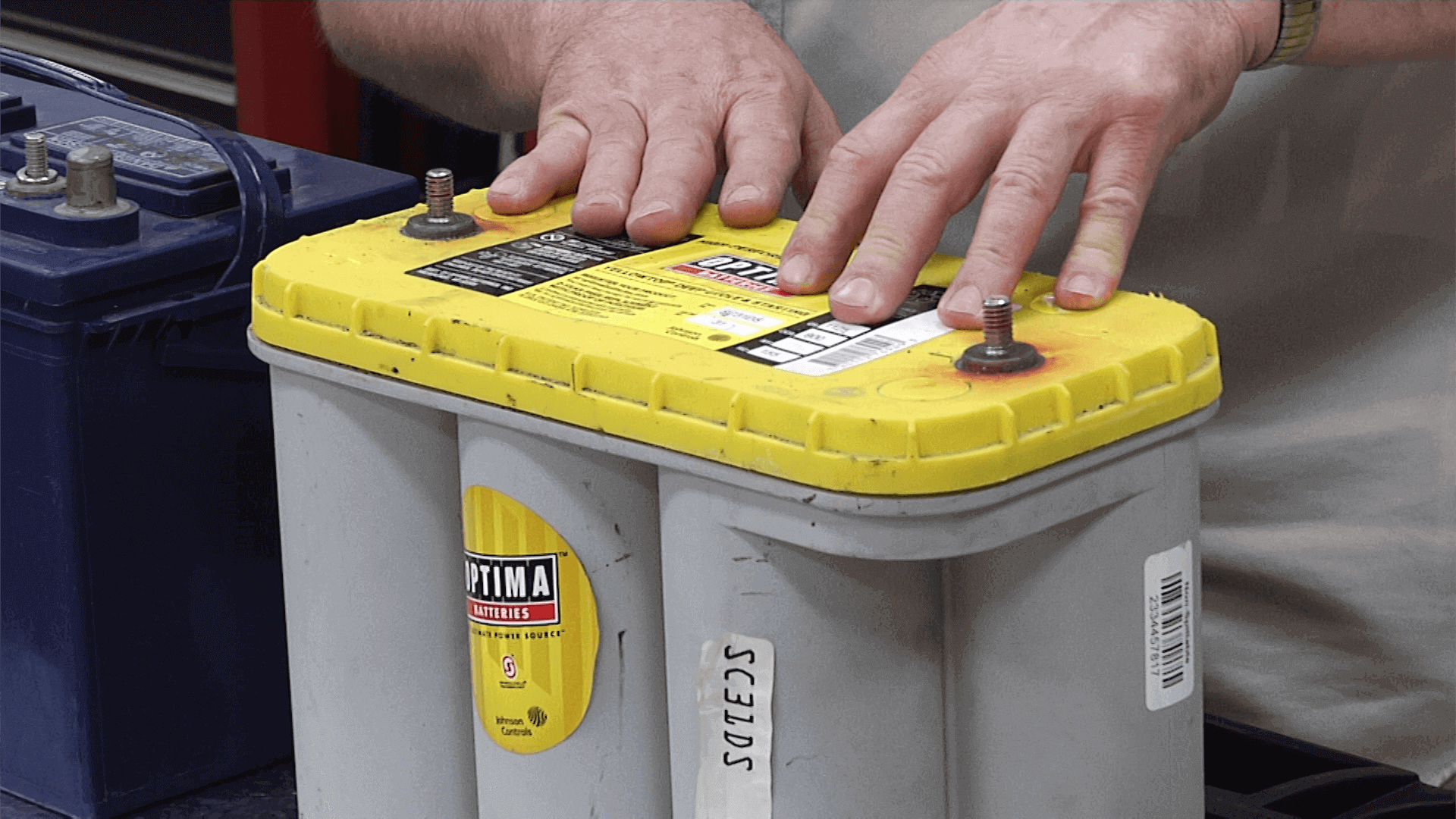When you buy through links on our site, we may earn an affiliate commission, Read More.
If you can’t get your head around why is your rv battery not charging, I’ve got everything you might need in this article.
It’s no brainer to know, every RV is different in terms of build Structure, size, features, and so on. But you know despite all these differences, one thing you will find common in all RV is its batteries. Small or big, every motorhome has a battery pack to power all your appliances.
As far as the usage goes, a well-maintained battery could last up to 3-4 years or more. Unfortunately, that’s not always the case.
In this article, I will focus on why the RV battery might not charge with possible solutions to fix this issue. In the end, there are tips and FAQs to improve your battery maintenance skill as well.
So, without further ado, let’s jump right in.
Tools You'll Need To Inspect Battery Issues
In a hurry? Check these tools for quick Inspection & Fixing:
- Volt Meter: Etekcity Digital Multimeter
- Battery Monitor: Bayite Battery monitor
- Circuit Tester: JASTIND Circuit Tester
- Battery Hydrometer: EZRED SP101 Battery Hydrometer
- Wire Cutter: Micro Cutter
- Wrench: TEKTON Torque Wrench
- Pliers: CRAFTSMAN Pliers
You can charge your RV battery in several ways, such as solar panel, garage outlet, and shore power at the RV parking spot. And it takes approximately 24 to 48 hours to complete full charging. Even after that, if you find your battery is dying fast, indeed there’s a problem and you need to fix it immediately.
Before you begin, you will need some basic tools to get started. From the looks of it, a battery is of simple construction. There is no definitive way of telling beforehand that your battery is suffering. Moreover, with the naked eye, it’s also hard to spot any inconsistency. That brings tools to be your only friend in these situations.
Volt Meter
This is a must-have tool for any Motor homeowner. It shows voltage and amps measurement coming out of a battery. You can use Etekcity Digital Multimeter to monitor how the battery is performing in this instance. However, make sure you don’t use it on any power line that is over its acceptable volt rating.
Battery Monitor
Most RV battery packs come with some kind of indication system to show the state of charging, charge completion, and low charge. Eventually, that system fails in time or doesn’t show necessary information in a detailed manner. And that’s where the Bayite Battery monitor comes handy.
Circuit Tester
The simplest and easiest tool to see if a particular wire or connection is live. The tool has a light to indicate and a ground wire at the end. I usually use JASTIND Circuit Tester to check whether the battery is discharging or any dead connections present there.
Battery Hydrometer
This is another must-have tool for any auto owner or a person who has a lead-acid battery in use. It checks the acid level in the battery water to give information on batteries’ overall health. You can use EZRED SP101 Battery Hydrometer to find any dead cell in your battery pack and remove it before it damages your electrical appliances.
Wire Cutter
For maintenance and fixing any wire related problems, a wire cutter is a vital tool. Connecting new wires and removing burned out wire needs a good wire cutter like Micro Cutter to ease your job.
Wrench
The battery does have bolts of different sizes in various places. Whether it’s for connecting wires to a battery or other electrical system, the TEKTON Torque Wrench can be handy in this regard.
Pliers
Reaching narrow places, holding wires securely, and bending wires is easy with pliers. Every toolbox deserves good pliers such as CRAFTSMAN Pliers. When you are working with batteries, there is no exception as well.
Possible Causes That Prevent The Battery From Charging Properly
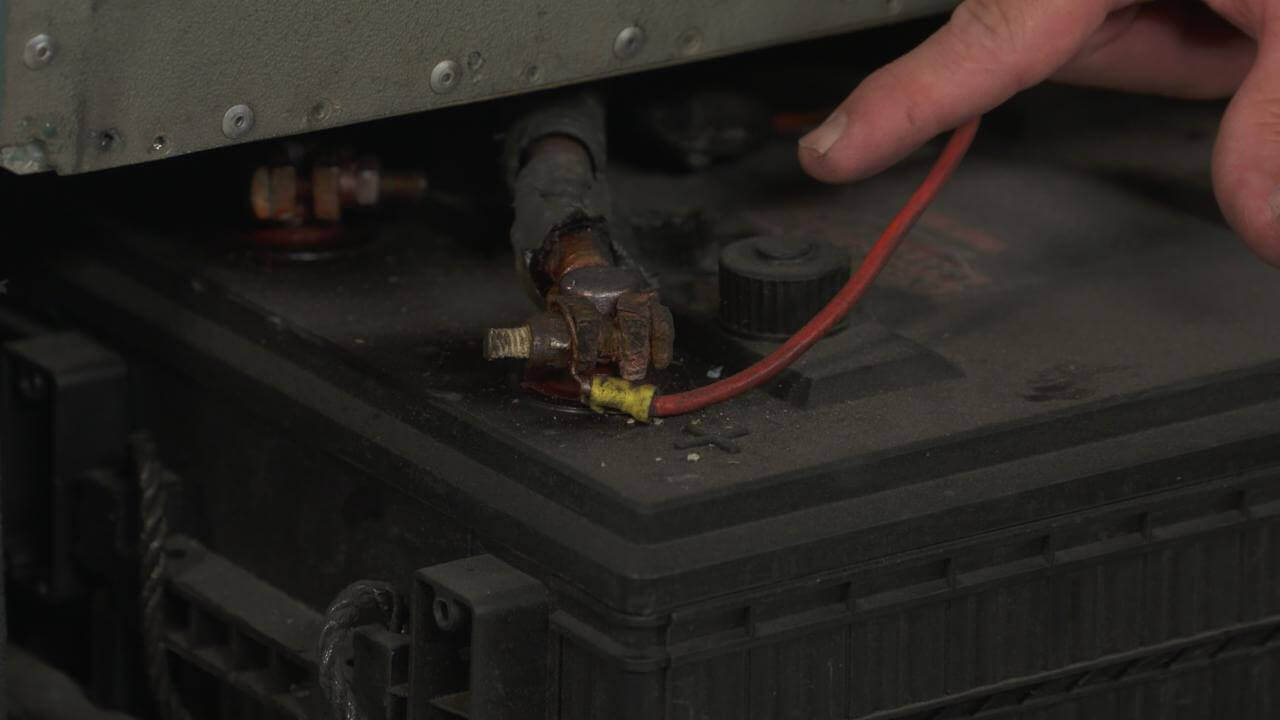
For your convenience, I have written down all the possible causes which I will explain and suggest solutions in the coming section.
- Battery Is Not Connected Correctly
- Dead Battery Cell
- Issues with Breaker
- Faulty Converter
- Blown Fuses
- Damaged of Burned Wire
It’s a challenge to a camper enthusiast or a motor homeowner if the RV battery is not charging while plugged in. Any individual who is not well versed in RV battery and a non-technical person could quickly lose their way around the battery whenever there is an issue.
But it doesn’t have to be like that. As long as you have the right technique and tools on hand, you can perform a simple diagnosis too.
Now, on to the fixes that you can apply to get rid of RV battery problems.
Explaining Each Causes With Possible Solutions
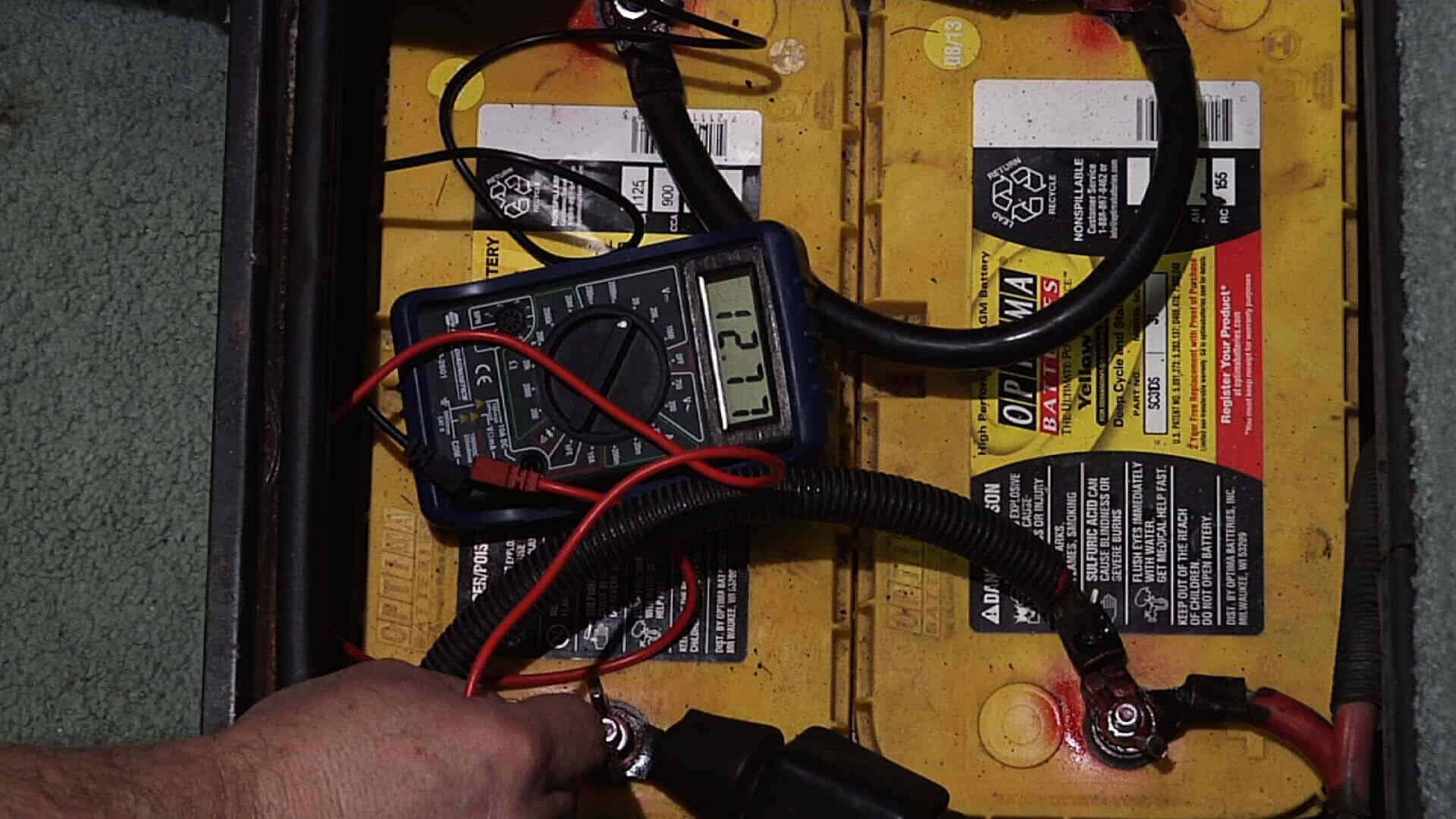
1. Battery Is Not Connected Correctly
Ever been in the situation while you are on the road and suddenly find that the RV battery is not charging while driving. Or after a long trip when you plug in to charge, but it’s not charging. Most of the time it’s because you have a loose connection.
Solution
Make sure you have a solid connection with the battery and with other charging components. To make it easy, you can use a good circuit tester like JASTIND Circuit Tester to find any dead connection and a Universal socket wrench to tighten up any loose bolts.
2. Dead Battery Cell
Although you have charged the battery to full capacity, sometimes you will face a problem it’s draining too fast. After a couple of hours, it will deplete to a very alarming state. Assuming you have great control over power usage, you will still be baffled by the unusual behavior. I say it’s time to check your battery.
Solution
The main agenda here is to find any dead cells in your battery. The easiest way to do that is with a hydrometer. EZRED SP101 Battery Hydrometer is a great choice under budget. Just take some water with the hydrometer and read the rating. If it’s in the red zone, it’s likely to be dead.
Another way you can check the dead battery is with a voltmeter. Just take voltage reading and compare it with the battery manufacturer’s voltage rating list. Any inconsistency indicates there’s a problem with your battery. Etekcity Digital Multimeter is an ideal example of a voltmeter you can use.
3. Issues with Breaker
RV Breakers tends to give you a great advantage on any surge protection. The wonderful feature of a breaker is, it breaks the connection when there’s an excessive current flow. And after that when it comes down to normal, the barker re-establish the circuit; if that’s not the case, you have a problem.
Solution
If there’s an issue with the breaker, it may stop current to get to the battery resulting charging issue. Installing a durable breaker like Tocas Circuit Breakers could be the step in the right direction and can serve you in the long run.
4. Faulty Converter
RV battery takes charge inline specific volt and amps rating. That’s where the converter comes in. It takes AC power and converts it to DC power that is suitable and safe for 12volt batteries. If the converter can’t do this job accordingly, you might face an RV converter draining battery issue due to improper charge delivery.
Solution
The best way to avoid any converter issue is to invest in a durable converter like Powermax PM4 which also comes with a 4 stage charging system. If you want a budget solution, you can also install the Bayite Battery monitor to keep track of how much voltage is coming in from your converter and prevent RV battery draining while plugged in.
5. Blown Fuses
Fuses are there to protect your electrical system from current overflow. It’s still the cheapest and safest way to defend power surges. A common issue with the fuses is it gets blown quite often. Which then hinders charging.
Solution
Check regular fuse boxes in your RV’s electrical system. If you find blown fuses in the set, change it out accordingly. It’s always a good idea to keep extra fuses in your Motorhome and garages. Because you never know when you will need one. AHL Auto Fuses can fill your needs in various RV fuses.
6. Damaged of Burned Wire
The old electrical wire system may get damaged for a long time. The wire can get burned due to surges or bare wires, which can overlap each other, causing the whole circuit to shorten.
Solution
After years of rough use, you should consider changing the old wire to maintain a safe electrical wire system in your RV. Tell your mechanic to use Ancor Marine Grade Wire which comes with great value and price.
Tips To Extend The Life Of RV Batteries
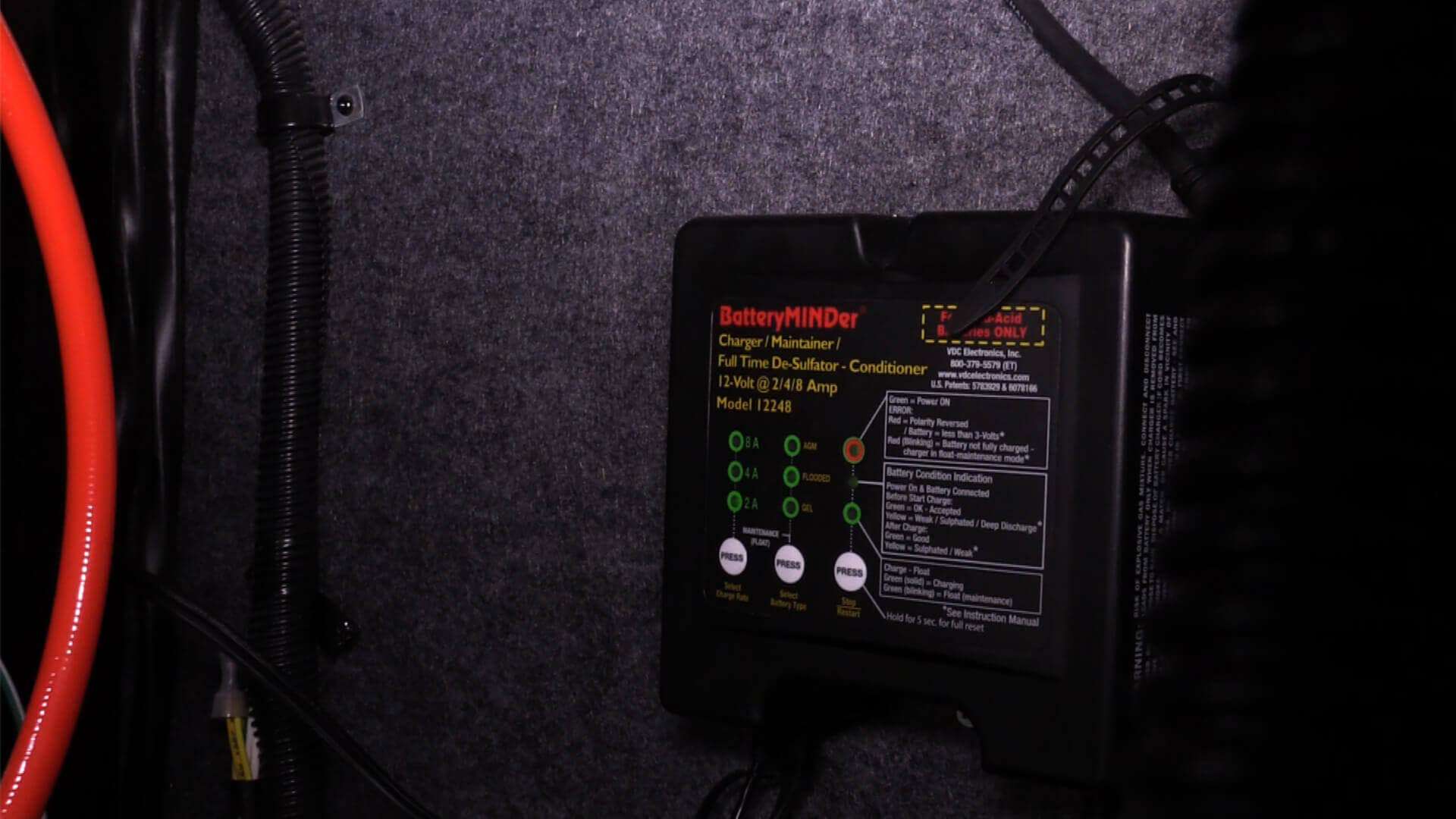
Properly kept RV batteries can last up to 5 years and so. All you need is to take care promptly which is not that complex. Anyone can follow through with this if you have a love for your RV. To make things simpler, I put together a list of tips to improve your maintenance skill.
1. Maintaining the charge level is the first tip of the bunch. Let me tell you why this is important. The lead-acid battery tends to form crystals on the copper plate while the charge level is lower than 80-70 percent. It’s called sulfation and it is the main reason batteries lose their expected life span.
2. Therefore, to prevent the crystal from forming, try to maintain charge level over 80 percent all the time. Fill it back promptly if it goes below that.
3. Always keep track of the water level in the battery. If you find that the water level is going down, add some more to it. Try to use distilled water as other water may result in a chemical reaction that might harm your battery.
4. Use a good AC converter for your battery. Remember your 12volts battery needs more than 12volts to properly take charges. Also, make sure your converter has surge protection and over charger protection.
5. Use a battery monitor to keep track of how much current you are drawing from the battery. If it’s on the right range per battery specification.
6. Never let your battery generate heat from charging or using state. If it gets hot over 150 Fahrenheit, there may be a problem. Immediately disconnect your battery and try to find the culprit. Only after that continue using the battery.
7. Remember to Switch your battery when you are not using the camper. When storing in the garage it’s also a good idea to turn off the battery or unplug it from the system. That way you can prevent any accidental discharge.
8. Try to manage power consumption whenever you can. A battery discharged to below 50 percent every day will last a lot less than a battery discharged to 70 to 80 percent.
9. Use a 3-stage charging system to extend battery life. The system charges the battery in 3 separate stages those are Bulk, Absorption, Floating. Each stage is intended to give the best possible range of volts and amps without hurting the battery.
Frequently Asked Question (FAQ)
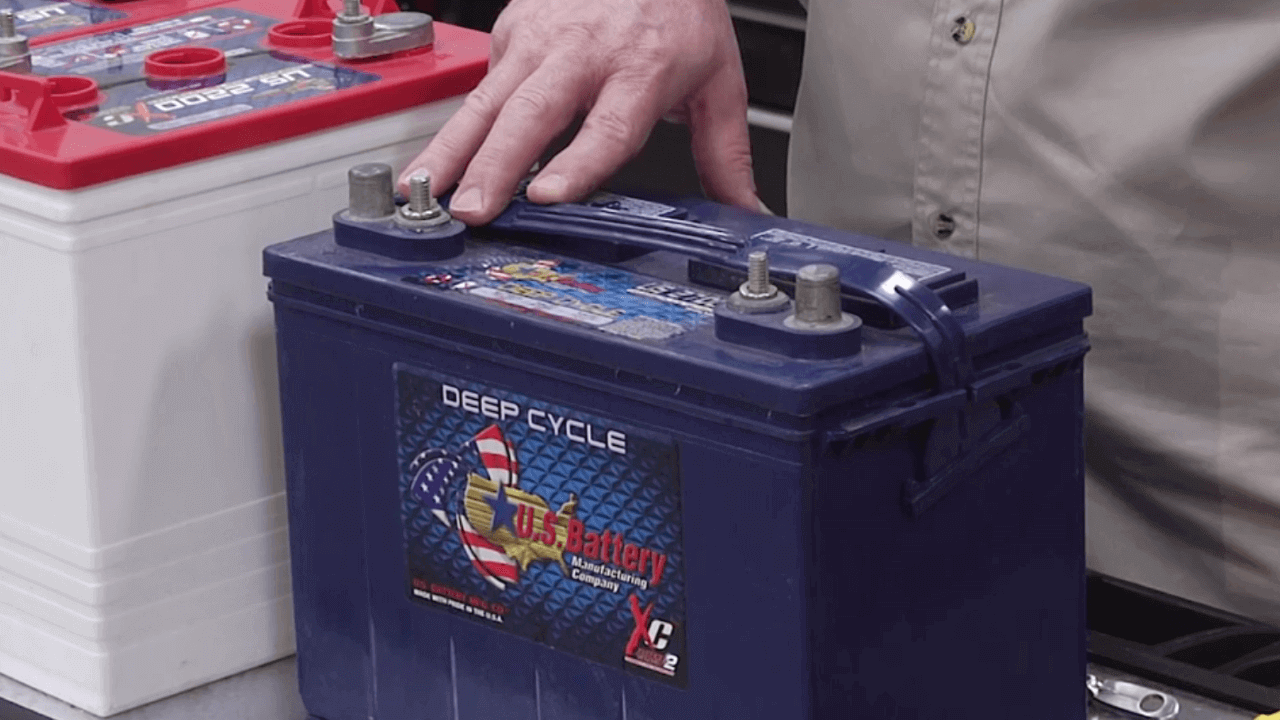
1. How Long Do I Need To Run A Generator To Charge RV Batteries?
Simply, there is no easy answer to that. Because you have to factor in many variables like, how much charge is left in your battery pack? What is the total watt-hour capacity in your battery pack? And How much current you are letting in through your charging system.
Many RV owners complain about their RV battery not charging from the generator. So, either there is a mechanical problem or they are not charging for enough duration. Depending on your battery pack size, a deep cycle battery needs 12-48 hours of charging. Make sure you follow the battery manufacturer’s instructions in this regard.
2. Can You Overcharge An RV Battery?
Yes, there’s a chance you can overcharge your battery if you left it on charge for a long time. Usually, the lead-acid battery takes 12 hours to charge completely. Lithium batteries take almost half of that. So, if you take more than that you may overcharge your battery system. that will generate heat and reduce the life span.
To prevent this problem, make sure you keep an eye on the heat level while charging. If it gets too hot, you should stop charging immediately. Alternatively, you can use a good charging system with overcharge protection or a battery monitor to track charge percentage.
3. How Long Should RV Batteries Last?
Most RVs use lead-acid batteries, also known as AGM batteries. Depending on usage, a well-maintained AGM battery lasts about 3-4 years in some cases even more. On the other hand, the lithium battery lasts more than that. 10-15 years to be exact. That’s also the reason lithium batteries tend to cost more than AGM batteries.
4. How Do You Charge A Dead RV Battery?
To maintain a good battery life, you should always use an appropriate charging system or a converter to fill up an empty battery. If you have a 12volt battery make sure the battery is getting more than 12volt from the charger. For amps, follow battery manufacturer instruction. Higher amps allow you to charge faster.
In general RV batteries can take charge in 3 three stages. First, Bulk charging keeps a constant voltage and amps to fill up around 80-90 percent of the total charge. Then remaining through absorption charging with variable voltage and amps. And finally, floating charge to maintain the charge level with the even lower current rating.
5. Why Does My Camper Battery Keep Dying?
There could be several reasons for your battery to keep dying quickly. Either your RV battery is not holding charge correctly or you are drawing too much power from the battery. Check thoroughly if you are drawing within the right parameter. If that’s no issue, it might be the battery problem.
Check if the battery is giving proper volt reading after a full charge. Also, check the battery’s water level and if there’s a dead cell with a hydrometer. Take necessary action immediately as it may hurt other good batteries.
6. Do RV Batteries Charge When Plugged Into Shore Power?
Shore power is a convenient way to charge your RV house battery while parking. Many camper parking spots have a 120v or 240v outlet to charge your house battery. One of the reasons shore power not charging house batteries might be not plugging to the right outlet. Make sure your converter has an appropriate voltage rating for the outlet and use a spike protector for extra safety.
7. Is It Bad To Leave Your RV Plugged In All The Time?
Yes, it is bad to leave plugged in after the charge is complete. Leavening it on for a long time may cause the battery to heat up, which will ultimately ruin battery life. But the modern charging system is more advanced than ever. Its overcharge protection system breaks the circuit after charging is complete to maintain good battery life.
Final Words
The battery pack in an RV is considered the Heart of any motorhome. So, if you are worried about your RV house battery, it’s only natural. And certainly, it will stress you out when you see your RV battery not charging accordingly. There’s no way around that.
Nonetheless, if you are well motivated to do regular checks and do maintenance on your battery? You will be far ahead before any major battery issue pops up. That will undeniably save you from a bad trip experience. I hope my article is an easy read for you all.
Feature & other Image Credit @ rvrepairclub.com


